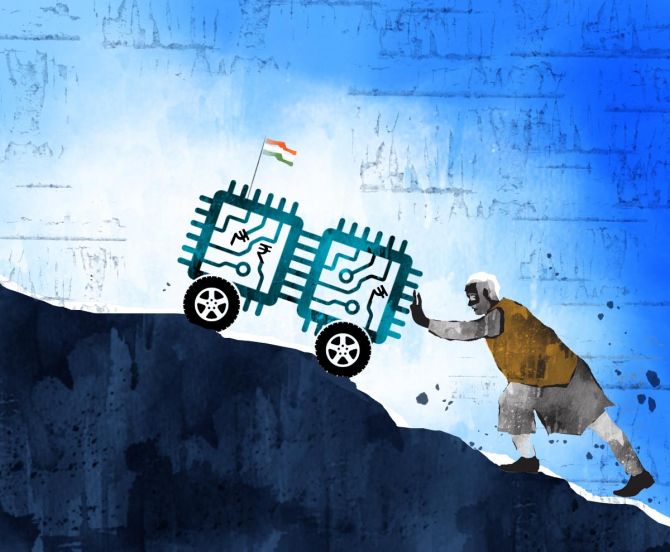India is all set to make its presence felt in the $47 billion global outsourced semiconductor testing and packaging market, an arena where Malaysia and Vietnam have been way ahead so far.

The Cabinet last Thursday cleared two projects, the Tata’s assembly testing and packaging plant (ATMP) and the Murugappa-owned CG Power with Renesas from Japan as its tech partner.
These, together with Micron’s assembly and testing plant which is already being constructed in Sanad in Gujarat, will collectively invest Rs 47,300 crore to set up the factories.
Others waiting for clearance from the government are an outsourced semiconductor assembly and testing (OSAT) plant by HCL, which has signed a joint venture with Foxconn, where it has a 40 per cent stake, and another by the Hiranandani Group under Tarq Semiconductors, and Kaynes Technology, with an investment of Rs 2,800 crore.
Under the semicon scheme, 50 per cent of this cost will be given as subsidy by the central government, while state government subsidies could contribute another 20-25 per cent.
The global OSAT/ATMP market is expected to hit $70 billion by 2029.
Malaysia (mostly in Penang) is a dominant player in the business in Asia, and commands 13 per cent share of the global semiconductor chip testing and packaging market.
Over 7 per cent of the global semiconductor trade flows from Malaysia, according to the Malaysia Semiconductor Industry Association.
Even Micron will shift some capacity and machines from Malaysia to India to set up its facility here.
It is also sending Indians to train in its facility in that country.
Vietnam, too, is wooing the same business.
For instance, Amkor, one of the largest US packaging and testing companies, is investing $1.6 billion in a plant to offer next-generation packaging facilities.
In November last year Intel announced that it will be expanding its chip testing plant for which it had already put in $1.5 billion.
The Taiwanese are, of course, the big players.
Six of the world’s top 10 OSAT players are Taiwanese.
But despite their auto vendors asking them to hedge their bets (they have factories in Taiwan and China) and set up facilities in another location, they have preferred to look at Vietnam, Philippines or Malaysia.
They have raised concerns over the stability of policy and frequent changes in taxation in India, an issue which minister of state for IT and electronics, Rajeev Chandrasekhar, says has already been resolved.
Of course, all the three projects in India are for ATMP which is meant to meet a companies own captive rquirement but there is flexibility to also get outsourced work from other players.
For the Tatas, the facility would meet the requirement for their own fab plant which was also cleared today and will be set up with an investment of over Rs 80,000 crore in Dholera, Gujarat. But it could also serve the global auto market requirement.
In the case of Micron, wafers are being imported from their fab plants to India, which will be exported afterwards.
The plan is also to sell some of the finished chips to their clients in India such as Apple Inc.
In the case of CG Power, sources say that Reneses, one of the largest players in microcontrollers, will package the wafers which they make in their fab plants or get from other sources.
PSMC: A chip off the global foundry block
With a 55.6 per cent share of the global foundry market, according to IDC in 2022, Taiwan Semiconductor Manufacturing Company is the leader.
However, you might not have heard of Powerchip Semiconductor Manufacturing Corporation (PSMC) because it is not among the top six players which include Samsung, United Microelectronics Corporation from Taiwan, US-based GlobalFoundries, and Chinese-headquartered Semiconductor Manufacturing International Corporation.
Nevertheless, according to TrendForce, it ranks at number 10 globally and is the third-largest player in Taiwan.
Its endeavour to establish business in India came to the public eye in 2022 when its executive vice-president, Martin Chu, visited India as part of a Taiwanese delegation led by government officials.
During this visit, he met with some Indian companies to test the waters.
Two years later, it has become the technology partner for the Tatas.
PSMC, specialising in power chips and other integrated circuits, owns two eight-inch and three 12-inch wafer fabs with over 8,000 employees and is constructing another brand new plant for 12-inch fabs in Taiwan.
However, this is also the first time it is looking overseas with its technology tie-up with the Tatas.
Though its chairman, Frank Huang, mentioned in Taiwanese newspapers that eight countries had invited them to set up a manufacturing facility, they declined due to higher costs.












 © 2025
© 2025